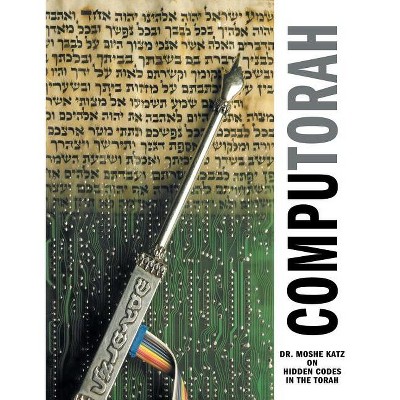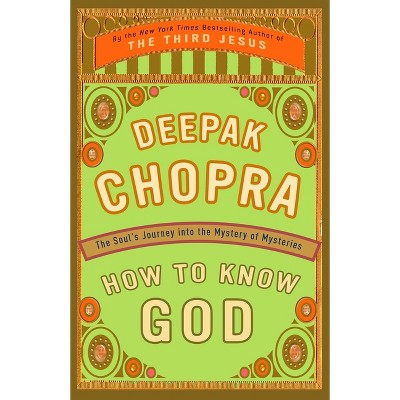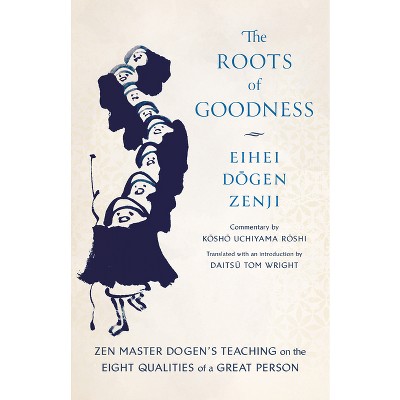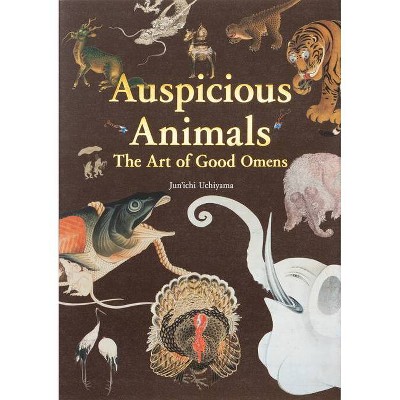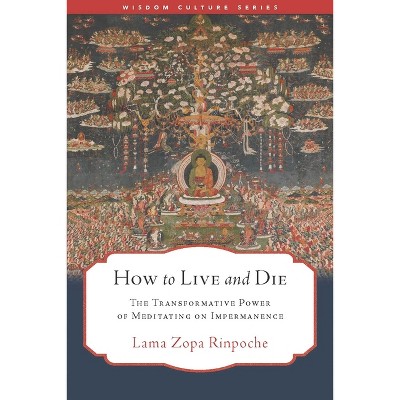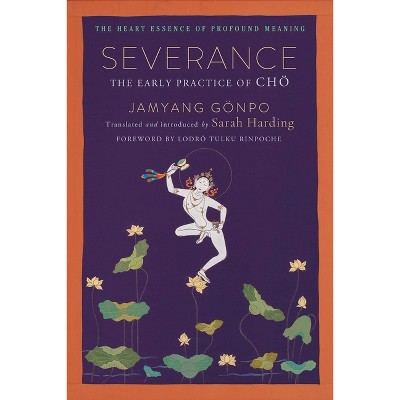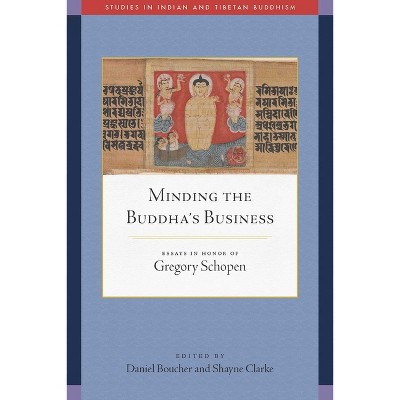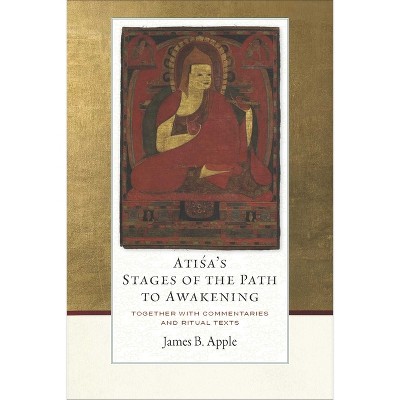Sponsored

The Sound That Perceives the World - by Kosho Uchiyama (Paperback)
$29.95
In Stock
Eligible for registries and wish lists
Sponsored
About this item
Highlights
- Musings and autobiographically informed commentary on the human condition through the lens of the Kannon-gyo--chapter 25 of the Lotus Sutra--connecting Zen and Pure Land Buddhism through the practice of venerating and chanting the names of buddhas and bodhisattvas.
- About the Author: Kosho Uchiyama was born in Tokyo in 1912.
- 272 Pages
- Religion + Beliefs, Buddhism
Description
About the Book
"The Kannon-gyo is chapter 25 of the Lotus Sutra, and its focus is the bodhisattva of compassion, Avalokiteshvara, known China as Guanyin, and in Japan as Kannon or Kanzeon. The text describes the many ways in which chanting the bodhisattva's name-Namu Kanzeon Bosatsu-can relieve suffering. Most schools of Zen Buddhism, and especially the Soto school, eschew such practices as chanting the names of buddhas and bodhisattvas, along with venerating such figures. The eminent Soto Zen master Kosho Uchiyama Roshi, however, while doing hard physical labor early in his career, could not practice zazen-that is, formal sitting meditation. He came to appreciate the Kannon-gyo and the practices related to it. In particular, he took to chanting Kannon's name, as recommended in the text of the Kannon-gyo. Later in life, Uchiyama Roshi suffered from illness that again prevented him from practicing formal Zen, so he returned to the Kannon-gyo and the practice of chanting. He went so far as to assert that chanting Kannon's name is completely equivalent to zazen, that the two practices are simply two sides of the same coin-a revolutionary idea seemingly at odds with Zen. Chanting practice is especially accessible, as it can be done while working, traveling, or suffering from illness, and other activities that would ordinarily get in the way of formal Zen practice. With these practices, the Kannon-gyo, and Kannon herself as a backdrop, Uchiyama Roshi muses about the purposes of religion, the goals of religious practice, and the meaning of enlightenment-and their relation to suffering itself"--Book Synopsis
Musings and autobiographically informed commentary on the human condition through the lens of the Kannon-gyo--chapter 25 of the Lotus Sutra--connecting Zen and Pure Land Buddhism through the practice of venerating and chanting the names of buddhas and bodhisattvas. The Kannon-gyo is chapter 25 of the Lotus Sutra, and its focus is the bodhisattva of compassion, Avalokiteshvara, known in China as Guanyin, and in Japan as Kannon or Kanzeon. The text describes the many ways in which calling out the bodhisattva's name--Namu Kanzeon Bosatsu--can relieve suffering. Most schools of Zen Buddhism, and especially the Soto school, eschew such practices as chanting the names of buddhas and bodhisattvas, along with venerating such figures. The eminent Soto Zen master Kosho Uchiyama Roshi, however, while doing hard physical labor early in his career, could not practice zazen--that is, formal sitting meditation. He came to appreciate the Kannon-gyo and the practices related to it. In particular, he took to reciting Kannon's name, as recommended in the text of the Kannon-gyo. Later in life, Uchiyama Roshi suffered from illness that again prevented him from practicing formal Zen, so he returned to the Kannon-gyo and the practice of chanting. He went so far as to assert that chanting Kannon's name is completely equivalent to zazen, that the two practices are simply two sides of the same coin--a revolutionary idea seemingly at odds with Zen. Chanting practice is especially accessible, as it can be done while working, traveling, or suffering from illness, and other activities that would ordinarily get in the way of formal Zen practice. With these practices, the Kannon-gyo, and Kannon herself as a backdrop, Uchiyama Roshi muses about the purposes of religion, the goals of religious practice, and the meaning of enlightenment--and their relation to suffering itself.Review Quotes
"The Sound That Perceives the World, an intimately personal account by a renowned Japanese Zen master, is an invitation for us to open the eyes and ears of our heart to the boundless compassion pervading the universe, and to come to realize that Kanzeon is no other than you and me, each and every one of us."--Ruben L.F. Habito, founding teacher, Maria Kannon Zen Center
"This book is full of surprises and encouragement to be who we really are, building clear bridges on perennial religious questions and excavating a trustworthy path from us to Shakyamuni Buddha. What a deep joy to receive the wisdom and great compassion of this wholehearted book."--Koshin Paley Ellison, Zen teacher and author of Untangled: Walking the Eightfold Path to Clarity, Courage, and Compassion
"This book is nothing less than a balm to soothe; medicine to relieve our symptoms; a gentle voice to encourage us to persist, delivered through this sensitive, accessible, and masterful translation by Howard Lazzarini. In the midst of this great fire we are living in, here is a voice to lead us to kindness and sanity, to the compassion and forgiveness that makes living possible."--Myozan Ian Kilroy, Soto Zen priest and author of Do Not Try to Become a Buddha: Practicing Zen Right Where You Are
"Uchiyama Roshi's fierce voice cuts through complacency. His unique integration of Zen, devotional Buddhist practice, Christianity, and existentialism offers a bracingly fresh view of the cry for help that forms much religious prayer."--Ben Connelly, Zen teacher and author of Inside the Flower Garland Sutra
About the Author
Kosho Uchiyama was born in Tokyo in 1912. He received a master's degree in Western philosophy at Waseda University in 1937 and became a Zen priest three years later under Kodo Sawaki Roshi. Upon Sawaki's death in 1965, he became abbot of Antaiji, a temple and monastery then located on the outskirts of Kyoto. Uchiyama Roshi developed the practice at Antaiji and occasionally traveled in Japan, lecturing and leading sesshins. The three pillars of his practice were his writings, his time spent guiding and talking with disciples and visitors, and zazen, the sitting practice itself. He retired from Antaiji in 1975 and lived with his wife at Noke-in, a small temple outside Kyoto, where he continued to write, publish, and meet with the many people who found their way to his door, until his death in 1998. He wrote over twenty books on Zen, including translations of Dogen Zenji in modern Japanese with commentaries, a few of which are available in English, as are various shorter essays. He was an origami master as well as a Zen master and published several books on origami. Shohaku Okumura is a Soto Zen priest and Dharma successor of Kosho Uchiyama Roshi. He is a graduate of Komazawa University and has practiced in Japan at Antaiji, Zuioji, and the Kyoto Soto Zen Center, and in Massachusetts at the Pioneer Valley Zendo. He is the former director of the Soto Zen Buddhism International Center in San Francisco. His previously published books of translation include Shobogenzo Zuimonki, Dogen Zen, Zen Teachings of Homeless Kodo, and Opening the Hand of Thought. Okumura is also editor of Dogen Zen and Its Relevance for Our Time and SotoZen. He is the founding teacher of the Sanshin Zen Community, based in Bloomington, Indiana, where he lives with his family. Howard Lazzarini holds a degree in Japanese Language and Literature from the University of California at Berkeley. He spent 12 years in Japan and for several years during that time, in the early 1970s, practiced Soto Zen at Antaiji, a small temple that was located in the north Takagamine section of Kyoto. There he met his first teacher, Kosho Uchiyama Roshi and sat in the shikantaza style of Uchiyama Roshi and Dogen. After returning to the US he began studying with Shohaku Okumura Roshi of Sanshin Zen Community in Bloomington, Indiana, where he took lay ordination. He translated The Sound that Perceives the World in close collaboration with Okumura Roshi and Shoko Hayashi Lazzarini, his wife. He currently lives in Everett, Washington, and practices with the Everett Zazen Group located in Everett.Dimensions (Overall): 8.94 Inches (H) x 6.1 Inches (W) x .8 Inches (D)
Weight: .9 Pounds
Suggested Age: 22 Years and Up
Number of Pages: 272
Genre: Religion + Beliefs
Sub-Genre: Buddhism
Publisher: Wisdom Publications
Format: Paperback
Author: Kosho Uchiyama
Language: English
Street Date: November 25, 2025
TCIN: 1001851782
UPC: 9781614299516
Item Number (DPCI): 247-13-7518
Origin: Made in the USA or Imported
If the item details aren’t accurate or complete, we want to know about it.
Shipping details
Estimated ship dimensions: 0.8 inches length x 6.1 inches width x 8.94 inches height
Estimated ship weight: 0.9 pounds
We regret that this item cannot be shipped to PO Boxes.
This item cannot be shipped to the following locations: American Samoa (see also separate entry under AS), Guam (see also separate entry under GU), Northern Mariana Islands, Puerto Rico (see also separate entry under PR), United States Minor Outlying Islands, Virgin Islands, U.S., APO/FPO
Return details
This item can be returned to any Target store or Target.com.
This item must be returned within 90 days of the date it was purchased in store, shipped, delivered by a Shipt shopper, or made ready for pickup.
See the return policy for complete information.
Frequently bought together

$16.20
MSRP $20.00
Buy 1, get 1 50% off select books
5 out of 5 stars with 2 ratings

$18.88
MSRP $27.00
Buy 1, get 1 50% off select books
4.8 out of 5 stars with 575 ratings
Trending Non-Fiction

$15.68
Buy 1, get 1 50% off select books
4.8 out of 5 stars with 204 ratings

Highly rated
$19.31
was $20.98 New lower price
Buy 1, get 1 50% off select books
4 out of 5 stars with 67 ratings

$18.28
was $19.58 New lower price
Buy 1, get 1 50% off select books
4.7 out of 5 stars with 17 ratings

$4.59
MSRP $7.99
Buy 1, get 1 50% off select books
4.8 out of 5 stars with 124 ratings

$6.20
MSRP $10.95
Buy 1, get 1 50% off select books
4.8 out of 5 stars with 33 ratings

$7.09
MSRP $9.99
Buy 1, get 1 50% off select books
4.9 out of 5 stars with 46 ratings
